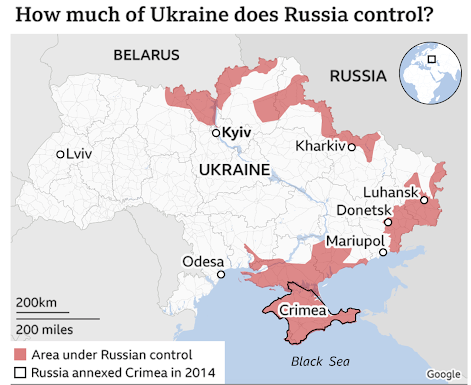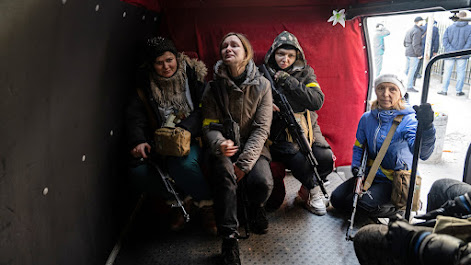Sunday, February 27, 2022
Well, another day of fighting has passed in Ukraine and the government in Kyiv is still in place. One interesting development is that the Russian government appears open to negotiating with Kyiv now. Zelensky is in the agonizing position of having to choose between extending the war or giving into Putin's demands.
Don't get me wrong--I'm no cheerleader for war, not when other people are doing the fighting, so I think Ukrainians should do what's best for them.The Russian leader certainly doesn't want to have to engage in street-to-street fighting in places like Kyiv or Odesa, and the Russian and Belarusian forces aren't going anywhere near Lviv and the west of the country. There's a reason for that.
And even if Russia were to succeed in knocking out the government in Kyiv and replacing it with a quisling: how difficult is it going to be for Moscow to hold onto these gains? Look at that map. Yes, Russia is a big and powerful country. But Ukraine is large. This is hardly going to be a cake-walk.
Ultimately, Putin is taking a big risk--and he's hoping against hope that Kyiv capitulates as quickly as possible. Yes, all of the fighting and dying is taking place on Ukrainian territory, but if the Ukrainians keep fighting, this situation has the potential to turn into a real quagmire for Russia.
As I wrote back in December:
My sense, however, is that if Russia were to actually invade eastern Ukraine, or the rest of the country more generally, it would not be the smooth, professional-looking mission that we saw in the Crimea. Invading Ukraine would be a much messier, and drawn-out affair, especially if Russia attempted to also occupy the western part of Ukraine, with its much higher proportion of ethnic Ukrainians.
 |
| Protesters in St. Petersburg |
Belarus, meanwhile, is in an even more precarious position than Russia. Alexander Lukashenko just recently survived almost a year of protests, in 2020-2021, over the election that he stole. Whereas in Russia the security forces might be successful in shutting down protests and intimidating Russians from speaking out against the war, the regime in Minsk is much more fragile than that of Russia.
*
Finally, to my friends in academia and elsewhere who have been repeating the notion that this somehow isn't about NATO, let me ask: if NATO were to foreswear ever admitting Kyiv to the alliance, do you really think that Putin's saber-rattling over NATO would just end right now?
I don't. As much as I hate to say it, even if Putin were to get everything he wants re Ukraine staying out of NATO, a year from now we'd likely be having a very similar conversation about another NATO country--probably one of the Baltic republics. My bet would be on the Estonian city of Narva, which is over 90% ethnic Russian. Like the Crimea, Narva is also an important site in Russian history, as this is where Charles XII of Sweden surrendered the land that would ultimately include St. Petersburg.
What if, say, a group of local residents in Narva were to set up a referendum and vote for annexation to Russia? And what if this were to happen with a US president less committed to NATO than our current one? We just had a president who openly mused about withdrawing from NATO on multiple occasions. This could happen again, and it wouldn't have to be DJT. The isolationist faction is increasingly becoming an important component of today's GOP, and among the Democrats as well there is an (albeit smaller) anti-militarist camp that is highly suspicious of the alliance.
As I mentioned yesterday, I think the weakest link in NATO at the moment is probably the American public. Nobody really needs to explain to eastern and western Europeans right now about the value of the NATO alliance: Ukraine is being attacked precisely because it's not a member of NATO. Yes, people disagree about things, but my guess is that belonging to NATO is a much less controversial topic at the moment in, say, Romania, than it was a year ago. When the German Social Democratic Party spearheads an effort to increase defense spending, you know something significant is happening.
But in the US, there are lots of people who can't find Ukraine on a map and are wondering why American treasury and, potentially, lives should be sacrificed for "people we hardly know." These aren't views that we can simply dismiss. NATO needs to be sold to a new generation of American voters, especially in parts of the country like the one I live in.
Right now, people in Ukraine are sacrificing everything in order to defend their country against a much more powerful adversary. In the United States, by contrast, we're responding mainly in the form of posting performative, virtue-sharing memes on Facebook and Twitter, sucking our thumbs and bemoaning the state of the world. News flash: this isn't about us and how upset war makes us feel.
Just an idea, but maybe one way that we could make a contribution right now would be through educating Americans, especially, about the continued importance of NATO and the US commitment to Europe, because we can no longer assume that there is any sort of consensus in this country about these issues.
Or would that just be too hard?
***
Also see:
Looking for the Long-Term in Putin's Moves
Moscow Recognizes Two Breakaway Republics: Why do this?
The Monroe Doctrine, Putin, and Post-Soviet Space: Don't Muddy the Waters
***
More commentary, photos, and links can be found in the Borderlands Lounge.





The prospect of a Baltic "Sudeten" problem hardly bears thinking about...
ReplyDeleteHowever, while Russia is huge and has a large population, it is worth bearing in mind that it has an economy the size of Spain's, though with huge amounts siphoned off by the kleptocracy. Could it really afford the expansionism it seems to be threatening, and have Russians really forgotten the losses of the Zinky boys in Afghanistan?
Good points. The thing is, I don't think Putin really wants to expand in the form of actually acquiring territory (the Crimea, I think, was an exception, as it gave Russia some concrete gains). What Putin wants is Russia-friendly foreign policymaking among its neighbors. So, for example, in Putin's mind Armenia doesn't need to become part of Russia, but Yerevan would hear about it if they started making steps toward NATO or the EU.
DeleteThe risk, however, is that threatening your neighbors to limit their contacts with the US and NATO is something that can morph into a war of expansion. For example, what if Zelensky pulls a Snake Island on Putin and just tells him to fuck off? Does Putin really want to fight it out street-by-street in urban areas, or try to occupy western Ukraine? He wants Zelensky to give up, because if he doesn't this war-of-changing-Ukraine's-foreign-policy becomes a war of expansion that Putin can't afford.
Just my view--no crystal ball.